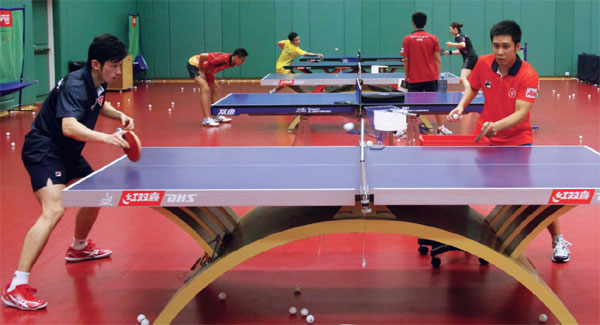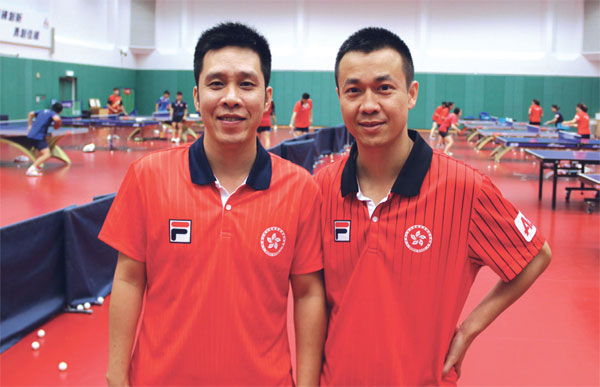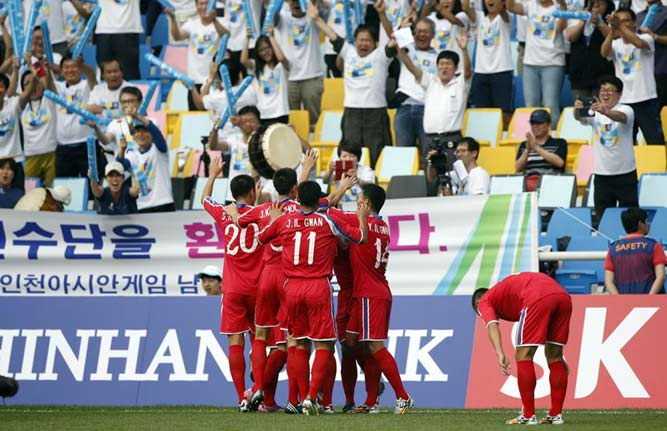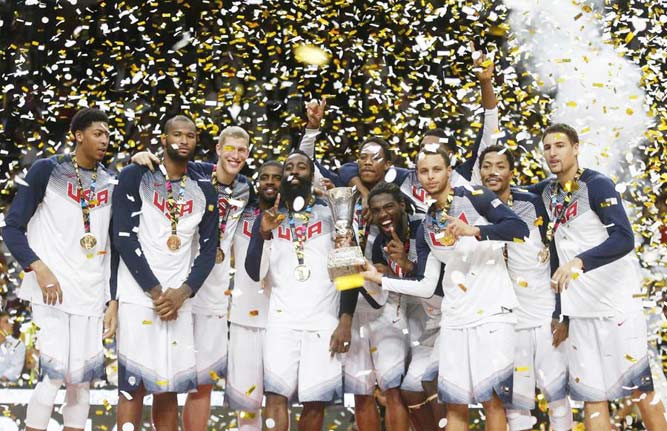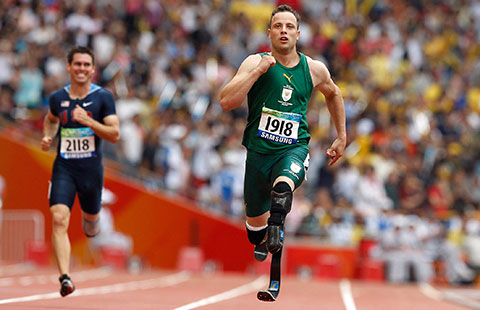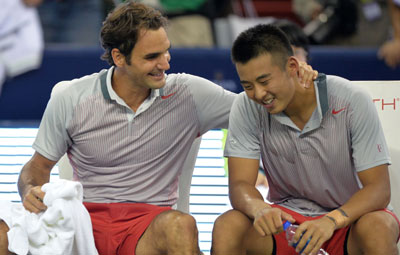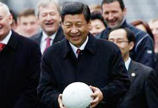Ready to serve
By Luis Liu (HK Edition) Updated: 2014-09-15 06:32
|
Ko Lai-chak (right), Olympics silver medalist and coach of Hong Kong men's table tennis team, trains local rising star Wong Chun-ting during a closed-door training session at Hong Kong Sports Institute for the upcoming 17th Asian Games in Incheon, South Korea. Ko aims to bring home at least one medal. Photos by Yu Qiwei / For China Daily |
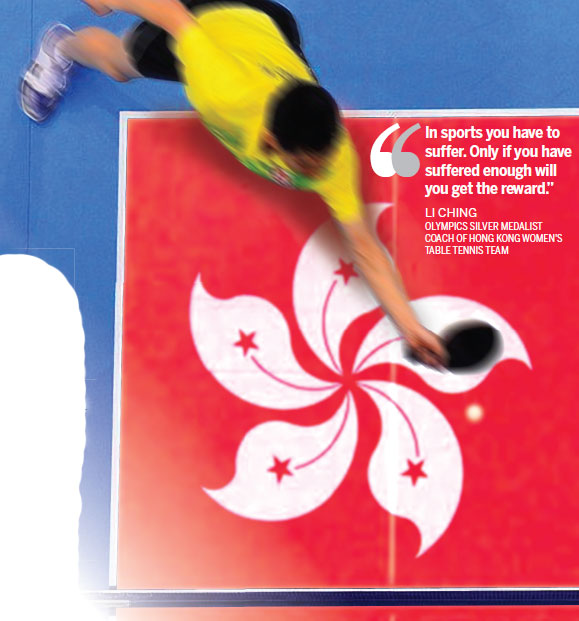
|
Ko Lai-chak (left) and Li Ching, co-winners of the Silver Medal in Men's Doubles at the 2004 Athens Olympics and the Gold at the 2006 Asian Games in Doha, are now working to keep Hong Kong's strength in table tennis. |
Ko Lai-chak's premature retirement from the international competition circuit has not dampened his spirits. These days he has his work cut out for him - taking the Hong Kong Men's Table Tennis Team through a rigorous training regimen so that they may shine at the Incheon Asian Games. Luis Liu met the ace sportsman.
Hong Kong is a city with few sports heroes. Table tennis great Ko Lai-chak is one exception. But the sports legend is off to a rocky start as coach of the Hong Kong Men's Table Tennis Team. He's working hard, getting ready for the Asian Games and trying to recover from the debacle at 2014 World Team Championships in Tokyo. It was the team's first major competition since Ko took over. Sadly, the Hong Kong men managed only a disappointing 17th place finish.
Now an almost tangible intensity pervades the scene as Ko works with his players, goading, shouting instructions: "Focus!" "Move!" and "Keep the tempo!" The 17th Asian Games will open on September 19th, in Incheon, South Korea. Ko is determined. Incheon will not be another blow to Hong Kong's prestige in the sport. And he has vowed to come back with "at least one medal".
The team's best hope rests with Tang Peng, 33, current No 14 in the International Table Tennis Federation (ITTF) World Rankings and Hong Kong's No 1 ranked player. Tang says he's up for the challenge. The Beijing-born player has already led the team to two men's team semifinals, in 2008 World Table Tennis Championships and at the 2012 London Olympics. "Injuries keep me from giving 100 percent. This time I will focus on doubles. We have more chances to bring something back home." Tang's doubles partner is the rising local star, Wong Chun-ting. The pair has already notched two international championships.
Ko Lai-chak's long-time doubles partner Li Ching, who retired from active competition at the same time as Ko, now coaches the Hong Kong Women's Team, a team with its own impressive history of Olympic Silver in Athens and a second Silver at the 2006 World Championships.
The coaching positions the two now occupy opened up simultaneously last year, when former coach Hui Jun, a prime contributor to the global stature of the Hong Kong men's team and his wife Li Huifen, who made similar contributions to women's table tennis here, announced they were leaving.
The two new coaches are left with difficult challenges. Table tennis is going through a difficult transition in Hong Kong. The significance of that transition may be revealed, in part, by reviewing the careers of the two tennis greats.
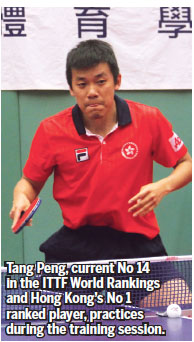
Ko and Li Ching, co-winners of the Silver Medal in Men's Doubles at the 2004 Athens Olympics and the Gold at the 2006 Asian Games in Doha, helped establish Hong Kong table tennis teams among the best in the world. But Hong Kong's "Table Tennis Twins" actually came from Guangdong - back in 2000, under the SAR's Quality Migrant Admission Scheme. They came here looking for opportunity.
Both players believed they were stuck with limited opportunities on the mainland. Both debuted with the Guangdong youth team. Both played well. Hong Kong, which avidly sought a breakthrough to establish a reputation in competitive sports, readily embraced the two young players.
Ping pong craze
"The 2006 Asian Games was the peak of our career," they said with one voice. "A gold medal is much more valuable than ten silvers," Li Ching said.
The triumphs of the duo set off a table tennis craze in Hong Kong. The government increased its investment in developing the sport. And more world-class players from the mainland came looking for better opportunities in Hong Kong.
Tang Peng was one. "In Hong Kong there are more choices for life, and more opportunities to play in international games," Tang said.
In 2008, however, the landscape changed when the International Table Tennis Federation changed the rules, declaring that any player over the age of 21 would no longer be permitted to represent an adopted country in a world competition.
Mainland players of the caliber of Li Ching, Ko and Tang would not be eligible to wear Hong Kong's colors at international events if they relocated here today. "In the future, we have to rely on 'made-in-Hong Kong' players," Li Ching said.
During the "ping pong craze", Hong Kong parents were eager for their kids to learn to play table tennis, to enhance agility and physical coordination with less possibility of injuries.
The Hang Seng Table Tennis Academy opened in 2001 under the sponsorship of the Hang Seng Bank in cooperation with the Hong Kong Table Tennis Association. The academy offers a four-level youth development structure. Kids get professional coaching from the age of five. There are eight local, open table tennis tournaments in Hong Kong and a five-level certification system to identify talented young players.
Future hopes
About a decade since the "craze", a group of 13 to 15-year-old players are already training with Hong Kong's first team.
Wong Chun-ting is an early success of the academy. Born in 1991, Wong started playing table tennis at home with his brother at the age of six, and later went to professional training at the age of nine.
Adopting the style of Ma Lin, the world's top pen-hold style player, Wong moved up the ranks quickly. He won a number of titles, was accepted as a member of Hong Kong's team and now is seen as part of the wave of the future.
At this year's ITTF Spanish Open, Wong won the bronze medal in men's singles and was promoted to No 47 in the ITTF world ranking.
Li Ho-ching, 22, the rising star on the women's team, currently ranked No 13 in the world, is another protg of the Hang Seng Academy.
Still, there are problems. A common problem among young local players is inconsistent performance. "Unlike on the mainland where players fight desperately to survive, many Hong Kong kids are trained by a one-on-one tutor which makes life much easier for them," Li Ching said.
Li Ching hopes parents understand why he is a tough coach. "In sports you have to suffer. Only if you have suffered enough will you get the reward," he said.
Now much of his time is spent communicating with young players and their parents. "A sportsman's career is always short. I understand why parents are reluctant to allow their children to devote all they've got to it," Ko said. "But to put it plainly, if you have a dream, chase it. It is simple."
Contact the writer at luisliu@chinadailyhk.com
(HK Edition 09/15/2014 page7)
